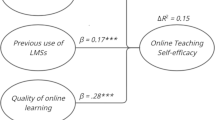Abstract
This study constructed an instrument based on the Activity theory to investigate the beginning online instructors’ online teaching competencies from the perspective of the online teaching process and applied it to beginning instructors to examine the validity. Eighty-nine beginning online instructors from China participated in this study. Confirmatory factor analysis, descriptive statistics analysis, and regression are used in this study. The results indicated that the Activity theory fit the practice well and the instrument is reliable. Chinese beginning online instructors’ online teaching competencies need to be improved, especially in preparing themselves to teach online and conducting meaningful appraisals of student learning. While beginning instructors’ gender and age had no significant influence on their online teaching competencies, instructors’ educational level, online teaching and learning experience had significant effects on their online teaching competencies. Most instructors perceived that designing and organizing online teaching, as well as evaluating students’ performance are the biggest challenges to move traditional courses online. Additionally, implications of this study and recommendations for future research are provided.


Similar content being viewed by others
References
Ahmed, M. A., Moradeyo, I., & Abimbola, I. O. (2016). Assesment of perceived academic and incentive needs of Senior Secondary School Biology Teachers in Kwara State, Nigeria. Malaysian Online Journal of Educational Sciences, 4(3), 12–23.
Akiri, A. A., & Ugborugbo, N. M. (2009). Analytic examination of teachers’ career satisfaction in public secondary schools. Studies on Home and Community Science, 3(1), 51–56.
Allen, I. E., & Seaman, J. (2008). Staying the course: Online education in the United States, 2008. ERIC.
Allen, I. E., & Seaman, J. (2013). Changing course: Ten years of tracking online education in the United States. ERIC.
Barbour, M. K., Siko, J., Gross, E., & Waddell, K. (2013). Virtually unprepared: Examining the preparation of K-12 online teachers Teacher education programs and online learning tools: Innovations in teacher preparation (pp. 60–81). Pennsylvania: IGI Global.
Bigatel, P. M., Ragan, L. C., Kennan, S., May, J., & Redmond, B. F. (2012). The identification of competencies for online teaching success. Journal of Asynchronous Learning Networks, 16(1), 59–77.
Blume, M., Emery, V., & Griffiths, R. B. (1971). Ising model for the λ transition and phase separation in He 3-He 4 mixtures. Physical Review A, 4(3), 1071.
Browne, M. W., & Cudeck, R. (1992). Alternatice ways of assessing model fit. Sociological Methods and Research, 21(2), 230–258.
Chou, C., & Tsai, C.-C. (2002). Developing web-based curricula: Issues and challenges. Journal of Curriculum Studies, 34(6), 623–636.
Davis, N., & Roblyer, M. (2005). Preparing teachers for the “Schools that technology built” Evaluation of a program to Train teachers for virtual schooling. Journal of Research on Technology in Education, 37(4), 399–409.
Dong, Y., Chai, C. S., Sang, G.-Y., Koh, J. H. L., & Tsai, C.-C. (2015). Exploring the profiles and interplays of pre-service and in-service teachers’ technological pedagogical content knowledge (TPACK) in China. Journal of Educational Technology & Society, 18(1), 158–169.
Engeström, Y. (1999). Activity theory and individual and social transformation. Perspectives on activity theory. Cambridge: Cambridge University Press.
Erie Consulting [EB/OL]. 2018 Chinese Online Education Industry Development Report. http://report.iresearch.cn/report/201902/3336.shtml
Garrison, D. R., Cleveland-Innes, M., & Fung, T. S. (2010). Exploring causal relationships among teaching, cognitive and social presence: Student perceptions of the community of inquiry framework. The Internet and higher education, 13(1–2), 31–36.
González-Sanmamed, M., Muñoz-Carril, P.-C., & Sangrà, A. (2014). Level of proficiency and professional development needs in peripheral online teaching roles. The International Review of Research in Open and Distributed Learning, 15(6), 162–187.
Harris, J. B., & Hofer, M. J. (2011). Technological pedagogical content knowledge (TPACK) in action: A descriptive study of secondary teachers’ curriculum-based, technology-related instructional planning. Journal of Research on Technology in Education, 43(3), 211–229.
Hew, K. F., & Cheung, W. S. (2014). Students’ and instructors’ use of massive open online courses (MOOCs): Motivations and challenges. Educational research review, 12, 45–58.
Hu, L. T., & Bentler, P. M. (1995). Evaluating model fit. In R. H. Hoyle (Ed.), Structural equation modeling: Concepts, issues and applications (pp. 76–99). London: Sage.
Jonassen, D. H., & Rohrer-Murphy, L. (1999). Activity theory as a framework for designing constructivist learning environments. Educational Technology Research and Development, 47(1), 61–79.
Kim, Y. (2018). Revisiting classroom practices in East Asian Countries: Examination of within-country variations and effects of classroom instruction. Teachers College Record, 120(7), n7.
Klein, J. D., Spector, J. M., Grabowski, B., De, I., & Teja, L. (2004). Teaching competencies instructor competencies: Standards for face-to-face, online & blended settings. Quarterly Review of Distance Education, 7(2), 195.
Klug, J., Krause, N., Schober, B., Finsterwald, M., & Spiel, C. (2014). How do teachers promote their students’ lifelong learning in class? Development and first application of the LLL Interview. Teaching and Teacher Education, 37, 119–129.
Koh, J. H. L., Chai, C. S., & Tsai, C.-C. (2010). Examining the technological pedagogical content knowledge of Singapore pre-service teachers with a large-scale survey. Journal of Computer Assisted Learning, 26(6), 563–573.
Kong, S.-C., Looi, C.-K., Chan, T.-W., & Huang, R. (2017). Teacher development in Singapore, Hong Kong, Taiwan, and Beijing for e-Learning in school education. Journal of Computers in Education, 4(1), 5–25.
Kopp, B., Matteucci, M. C., & Tomasetto, C. (2012). E-tutorial support for collaborative online learning: An explorative study on experienced and inexperienced e-tutors. Computers & Education, 58(1), 12–20.
Lektorsky, V. A. (1999). Activity theory in a new era. Perspectives on activity theory (pp. 65–69). Cambridge: Cambridge University Press.
Liu, G. (2015). Analysis of online tutor’s ability improvement in contemporary distance education. Journal of Shanxi Radio & Tv University.
Liu, Q., Zhang, S., & Wang, Q. (2015). Surveying Chinese in-service K12 teachers’ technology, pedagogy, and content knowledge. Journal of Educational Computing Research, 53(1), 55–74.
McAllister, L., & Graham, C. (2016). An analysis of the curriculum requirements for K-12 online teaching endorsements in the US. Journal of Online Learning Research, 2(3), 247–282.
Mccown, L. J. (2010). Blended courses: The best of online and traditional formats. Clinical Laboratory Science, 23(4), 205.
Mercer, N., & Howe, C. (2012). Explaining the dialogic processes of teaching and learning: The value and potential of sociocultural theory. Learning, Culture and Social Interaction, 1(1), 12–21.
Michaelowa, K., & Wittmann, E. (2007). The cost, satisfaction, and achievement of primary education-Evidence from Francophone Sub-Saharan Africa. The Journal of Developing Areas, 41(1), 51–78.
Murphy, E., Rodríguez-Manzanares, M. A., & Barbour, M. (2011). Asynchronous and synchronous online teaching: Perspectives of Canadian high school distance education teachers. British Journal of Educational Technology, 42(4), 583–591.
Palinscar, A. S., & Brown, A. L. (1984). Reciprocal teaching of comprehension-fostering and comprehension-monitoring activities. Cognition and instruction, 1(2), 117–175.
Pang, S. (2016). A national survey of literacy faculty practices, beliefs, and attitudes toward online courses. Clemson: Clemson University.
Paquette, G. (2007). An ontology and a software framework for competency modeling and management. Journal of Educational Technology & Society, 10(3), 1–21.
Patrick, P. K. S., & Yick, A. G. (2005). Standardizing the interview process and developing a faculty interview rubric: An effective method to recruit and retain online instructors. Internet & Higher Education, 8(3), 199–212.
Peechapol, C., Na-Songkhla, J., Sujiva, S., & Luangsodsai, A. (2018). An exploration of factors influencing self-efficacy in online learning: A systematic review. International Journal of Emerging Technologies in Learning (iJET), 13(09), 64–86.
Planar, D., & Moya, S. (2016). The effectiveness of instructor personalized and formative feedback provided by instructor in an online setting: Some unresolved issues. Electronic Journal of E-Learning, 14(3), 196–203.
Richter, S. L., & Ware, L. J. (2016). Nurse educator self-assessed technology competence and online teaching efficacy: A pilot study.
Roberts, J. (2018). Future and changing roles of staff in distance education: A study to identify training and professional development needs. Distance Education, 39(1), 37–53. https://doi.org/10.1080/01587919.2017.1419818.
Rossel, Y. (2012). lavaan: An R package for structural equation modeling. Journal of Statistical Software, 48(2), 1–36.
Savery, J. R. (2005). BE VOCAL: Characteristics of successful online instructors. Journal of Interactive Online Learning, 4(2), 141–152.
Schmidt, D. A., Baran, E., Thompson, A. D., Mishra, P., Koehler, M. J., & Shin, T. S. (2009). Technological pedagogical content knowledge (TPACK) the development and validation of an assessment instrument for preservice teachers. Journal of Research on Technology in Education, 42(2), 123–149.
Seirup, H. J., Tirotta, R., & Blue, E. (2016). Online education: Panacea or plateau. Journal for Leadership and Instruction, 15(1), 5–8.
Sogillo, R. R. O., Guimba, W. D., & Alico, J. C. (2016). Assessment of mathematics teachers in a public and a private School: Implications to the quality of teaching secondary mathematics. Advances in Sciences and Humanities, 2(2), 7–16.
Stein, D. S., & Wanstreet, C. E. (2017). Jump-start your online classroom: Mastering five challenges in five days. Sterling: Stylus Publishing, LLC.
Whitaker, J. P. (2015). Traditional faculty in transition: theory, change, and preparation for the online paradigm. Alabama: The University of Alabama.
Xiao, Xiao. (2018). Supporting the construction of College Teachers’ Information-based teaching ability with online open course system. University Teaching in China, 09, 70–73.
Zurita, G., & Nussbaum, M. (2010). A conceptual framework based on Activity Theory for mobile CSCL. British Journal of Educational Technology, 38(2), 211–235.
Acknowledgements
This work is supported by Ministry of education—China mobile research fund project, “Research and experiment on Regional Teaching and research mode supported by information technology” (No. MCM20170502) and Hubei Province Technology Innovation special projects “Key technologies and demonstration applications of Internet + Precision Education” (No. 2017ACA105), as well as Fundamental Research Funds for the Central Universities In Central China Normal University “Tests and evaluation of teacher development”(No. CCNU16JCZX05).
Author information
Authors and Affiliations
Corresponding author
Additional information
Publisher's Note
Springer Nature remains neutral with regard to jurisdictional claims in published maps and institutional affiliations.
Rights and permissions
About this article
Cite this article
Wang, Y., Wang, Y., Stein, D. et al. Examining Chinese beginning online instructors’ competencies in teaching online based on the Activity theory. J. Comput. Educ. 6, 363–384 (2019). https://doi.org/10.1007/s40692-019-00140-w
Received:
Revised:
Accepted:
Published:
Issue Date:
DOI: https://doi.org/10.1007/s40692-019-00140-w




